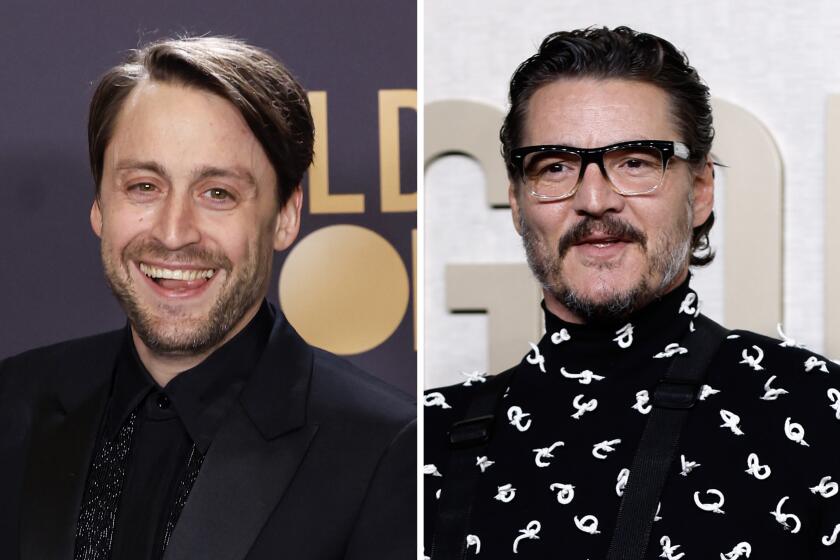Read Jane Fonda’s full Golden Globes 2021 speech for Cecil B. DeMille Award
In accepting the Cecil B. DeMille Award at the 2021 Golden Globes Sunday, Jane Fonda called for more inclusion in Hollywood’s storytelling ranks.
In her virtual acceptance speech, she spoke of the importance of storytelling, citing specific examples from major releases on film and TV last year. “But,” she added, “there’s a story we’ve been afraid to see and hear about ourselves in this industry. The story about which voices we respect and elevate and which we tune out. It’s about who’s offered a seat at the table and who was kept out of the rooms where decisions are made. So that’s all of us, including all the groups who decide who gets hired and what gets made and who wins awards.
“Let’s all of us make an effort to expand that tent, so that everyone rises and everyone’s story has a chance to be seen and heard.”
The veteran actor and longtime activist had previously urged the Hollywood Foreign Press Assn. to diversify its membership by including Black members, days after an L.A. Times investigation revealed the 87-member awards group has none. Fonda initially shared her concerns with the HFPA last week during a video call interview with members of the group led by Scott Orlin. A transcript of the Feb. 24 session shows a light conversation about Fonda’s early awards show experiences, when she interjects, “But I must say, get more women! I’m only the 17th time that a woman has won. And also, we need to help you get more Black members.”
In her acceptance speech, she said, “I mean, doing this simply means acknowledging what’s true, being in step with the emerging diversity that’s happening because of all those who marched and fought in the past and those who picked up the baton today. After all, art has always been not just in step with history but has led the way. So let’s be leaders. OK?
Here are the six highlights from Sunday’s 78th Golden Globes, including Jane Fonda’s inspiring speech and Chadwick Boseman’s posthumous win.
Despite that mild rebuke, Fonda, 83, thanked the HFPA and joined a distinguished list of recipients of the award, a list that includes Walt Disney, Darryl F. Zanuck and Meryl Streep. In her Feb. 24 interview with the HFPA, she had noted that the prize — considered the HFPA’s highest honor, for “outstanding contributions to the world of entertainment” — has been bestowed upon only 17 women since it was first handed out in 1952.
Fonda had previously been awarded seven Globes (out of a whopping 15 nominations) for her work in movies such as “Klute” and “Coming Home,” the two films for which she also won Oscars. As distinguished as her career in cinema (and, for the last several years, television as the colead of Netflix’s “Grace and Frankie”) has been, Fonda is equally known for her activism.
Starting with her vocal opposition to the Vietnam War early in her career, she has also actively supported many feminist and environmental causes, opposed the Iraq War and supports a “two-state solution” in the Israeli-Palestinian conflict. She has been arrested six times for participating in protests, including five times in 2019 for weekly climate-change protests.
The full text of her acceptance speech follows:
“Thank you all the members of the Hollywood Foreign Press Assn. I’m so moved to receive this honor. Thank you.
“You know, we are a community of storytellers, aren’t we? And in turbulent, crisis-torn times like these, storytelling has always been essential. You see, stories have a way that — they can change our hearts and our minds; they can help us see each other in a new light, have empathy to recognize that for all our diversity, we are humans, first, right? I’ve seen a lot of diversity in my long life, and at times, I’ve been challenged to understand some of the people I’ve met. But inevitably, if my heart is open and I look beneath the surface I feel kinship.
“That’s why all of the great conduits of perception — Buddha, Muhammad, Jesus, Lao-Tzu, all of them spoke to us in stories and poetry and metaphor. Because the nonlinear, noncerebral forms that are art, speak on a different frequency. They generate a new energy that can jolt us open and penetrate our defenses, so that we can see and hear what we may have been afraid of seeing and hearing.
“Just this year, ‘Nomadland’ helped me feel love for the wanderers among us and ‘Minari’ opened my eyes to the experience of immigrants dealing with the realities of life in a new land, and ‘Judas and the Black Messiah,’ ‘Small Axe,’ ‘United States vs. Billie Holiday,’ ‘Ma Rainey’ and ‘One Night in Miami’ and others have deepened my empathy for what being Black has meant. ‘Ramy’ helped me feel what it means to be Muslim American.
“ ‘I May Destroy You’ has taught me to consider sexual violence in a whole new way. The documentary ‘All In’ reminds us how fragile our democracy is and inspires us to fight to preserve it, and ‘A Life on Our Planet’ shows us how fragile our small blue planet is and inspires us to save it and ourselves.
“Stories. They really can change people.
“But there’s a story we’ve been afraid to see and hear about ourselves in this industry. The story about which voices we respect and elevate and which we tune out. It’s about who’s offered a seat at the table and who was kept out of the rooms where decisions are made. So that’s all of us, including all the groups who decide who gets hired and what gets made and who wins awards. Let’s all of us make an effort to expand that tent, so that everyone rises and everyone’s story has a chance to be seen and heard.
“I mean, doing this simply means acknowledging what’s true, being in step with the emerging diversity that’s happening because of all those who marched and fought in the past and those who picked up the baton today. After all, art has always been not just in step with history but has led the way. So let’s be leaders. OK? Thank you. Thank you so much.
“And Happy Birthday, Tommy Tune!”
More to Read
From the Oscars to the Emmys.
Get the Envelope newsletter for exclusive awards season coverage, behind-the-scenes stories from the Envelope podcast and columnist Glenn Whipp’s must-read analysis.
You may occasionally receive promotional content from the Los Angeles Times.











